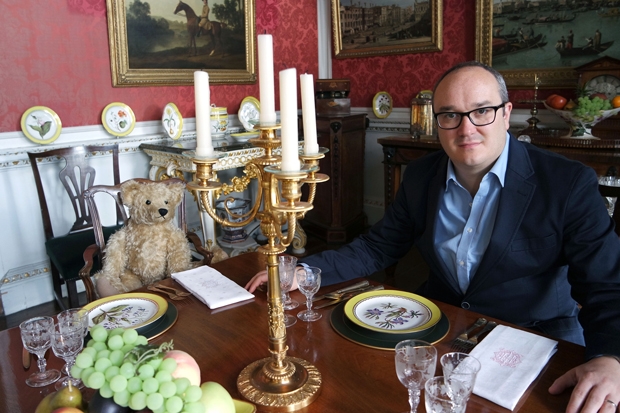The first episode of Let Us Entertain You (BBC2, Wednesday) definitely couldn’t be accused of lacking a central thesis. Presenter Dominic Sandbrook began by arguing that, since its industrial heyday, Britain has changed from a country that manufactures and exports things into one that, just as successfully, manufactures and exports popular culture. He then continued to argue it, approximately every five minutes, for the rest of the programme.
By way of proof, Sandbrook presented a fairly random collection of postwar Britain’s greatest hits, which served both as examples and as opportunities for some nifty wordplay designed to hammer the point home still further. The fact that Black Sabbath, for instance, emerged from late-Sixties Birmingham just as many of the steelworks were closing allowed Sandbrook to declare with a flourish that ‘Birmingham began to forge a very different kind of metal’. He also compared J. Arthur Rank to James Watt, the creators of the video game Elite to Richard Arkwright and, more generically, Andrew Lloyd Webber to a classic Victorian entrepreneur.
At one stage, the historical parallels went back further, when Sandbrook visited the Bodleian Library to show us ‘a document that arguably shaped modern Britain as much as the Magna Carta’ — and which turned out to be the first issue of the Sunday Times magazine. On the whole, however, he stuck to comparisons with people from the Industrial Revolution, whose entrepreneur-ial spirit can apparently be seen in everything from Jean Shrimpton’s mini skirts to Damien Hirst’s shark. As for the Beatles, they may have written some decent songs, but ‘perhaps the best way to understand them’ is as ‘an immaculately packaged product’ that exported Britishness to the world.
And why wouldn’t the world want that? Certainly, Sandbrook’s commitment to making sure we got the point was matched on Wednesday only by his patriotism. ‘We love to run ourselves down,’ he noted sorrowfully — but in fact Britain ‘does popular culture better’ and has contributed more of it to a grateful global audience than any other country (only later, and only once, did he add the sheepish rider ‘relative to its size’). Indeed, Sandbrook proved so patriotic that he was even able to claim Bob Marley as one of our gifts to all those foreigners. Marley, you see, was made a star by Britain’s own Chris Blackwell — which, as luck would have it, also permitted another parallel with the 19th century: ‘Where the Victorians had imported Jamaican sugar, Blackwell was going to import Jamaican music.’
In fairness, Sandbrook’s thesis is quite an interesting one — or at least it was the first few times we heard it. The programme also had lots of great archive clips, and a sharp eye for the arresting detail, such as a 1965 letter to the Times giving the Beatles due credit for having ‘saved the British corduroy industry’, or the heavy influence of the King’s Road and Carnaby Street on the clothes shops of 1960s Caracas. Like a sort of slow-motion version of the 2012 Olympics opening ceremony, it did kindle an undeniable sense of national pride at all that we’ve achieved.
Nonetheless, the contrast between such thrilling content and Sandbrook’s rather plodding exposition remained hard to ignore — a problem not helped by his addiction to cliché. This was a commentary where every ‘mix’ was ‘heady’, the word ‘British’ was generally preceded by ‘quintessentially’ and Andrew Lloyd Webber turned within seconds from ‘new kid on the block’ to ‘hottest ticket in town’.
After a well-received one-off earlier this year, The Secret Life of Four-Year-Olds (Channel 4, Tuesday) is now a series based on the simple notion of inviting ten assorted children to a nursery for a week and filming what happens. It’s an idea, you might think, that couldn’t possibly go wrong — and sure enough, it doesn’t, with the memorable examples of kids saying the darnedest things piling up at a quite staggering rate.
Before long, the girls were duly involved in a complex system of shifting alliances to rival anything in 18th-century European politics. After quickly becoming friends, Charlotte and Tia had a serious row when Tia disobeyed a house rule and Charlotte threatened to tell not only the teacher, but ‘even Father Christmas and the tooth fairy’. (In the event, she just told the teacher.) The consequent falling out meant that when Tia wanted to play together later, Charlotte turned her down on the unimpeachable grounds that ‘I love Lola more’. ‘I’m really sad,’ lamented Tia to the camera, between sobs. ‘Nobody’s ever said that to me before, and now they have.’ (Spoiler alert: the two soon made up.)
As for the boys, I suspect my heart can’t have been the only one that sank when Theo’s new-age mother claimed that he had ‘a great love and a great sense of spiritual wisdom’. Unexpectedly, though, this proved to be pretty much true. Theo was first seen consoling the girls after they’d controversially lost a relay race against the boys, assuring them that ‘you’ll win next time’ as his team-mates ran around in gloating delight. He then set about befriending Tyler, who’d spent the first couple of days on his own — and with such success that they ended the week in each other’s arms declaring their mutual love. Meanwhile, of course, there was plenty of confirmation that if four-year-olds were subject to the same rules as adults, most of them would be sectioned under the mental health act.
The programme did also have a couple of child-development experts whose job was apparently to watch the action on TV screens and then tell us what we’d just seen — which left the programme more charming than particularly revelatory. On the other hand, when the charm’s as overwhelming as this, who cares?






Comments